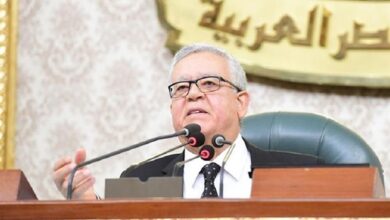
George H. W. Bush visited Egypt when he was US Vice President for President Ronald Reagan when former President Mubarak set up a dinner for him at the Koubbeh Palace. My seat was beside a US national. I began to get acquainted with him, and he told me he was a federal judge practicing as the acting administrator of presidential oaths.
He said that his job is to accompany the vice president wherever he goes so that if the US President is exposed to sudden danger that prevents him from exercising his responsibilities, the vice president will take the oath before the judge. His post eliminates the risk of constitutional vacuum or a break in the presidential post–even if for a few minutes–as it is the president who holds the nuclear codes and serves as the highest decision-maker in the country.
The US judge told me that he learned his lesson when President John F. Kennedy was assassinated in November 1963. His deputy, Johnson, was sworn in at Air Force One in front of a judge in order to avoid a time gap in which the United States would go on without a president.
In our country, companions of the late President Abdel Nasser took the title of vice president, but the first true vice president was the late Marshal Abdel Hakim Amer.
The last year of Nasser’s life witnessed speculations of a plot to assassinate him during his visit to Morocco, so he chose Anwar al-Sadat as his deputy, followed by Hussein al-Shafei. If the late president would have been subjected to harm, Sadat as vice president would fill the constitutional vacuum until a new president was elected.
Then it became a rule that the vice president always becomes the next president. Sadat succeeded Nasser and Mubarak succeeded Sadat. The vice president post in Egypt became similar to the crown prince position in the royal system. This system does not necessarily conform with the democratic tradition, as each president chooses his deputy, who may become his successor.
In my opinion this matter needs serious discussion, especially in light of parliamentary hearings on constitutional amendments in our country as part of political reform in preparation for a better future. I offer the following conditions:
First: there is a need to separate the post of vice president and the post of the next president, so that people do not expect that the vice president will lead the country’s future. As is, he is surrounded by polarization, which leads to duplication of loyalty and tension in the helm of power.
Therefore, I sincerely call for the new constitution to provide that the role of vice president is a standalone post whose term concludes at a set time, and that its holder is not entitled to run in the presidential elections at the end of his term–he must leave office for a full term before he run for president.
This is not an arbitrary observation. Rather, I see it as necessary for the stability of political life. It is imperative that the president be devoted to administrating the country and leading the nation while the vice president–according to his specialty–is assigned to daily internal tasks. He will relieve burden from the president so that the system will be balanced without excess sensitivities or intransigence.
Therefore, disengagement between the post of vice president and the post of next president is a necessity that must be provided by the constitution if the authors are convinced of this interpretation.
Second: The relationship between friends Nasser and Amer ended tragically. There was a confrontation between their supporters in the wake of the 1967 Naksa, while the period of the relationship between Sadat and Mubarak went without great problems.
There are those who believe that Sadat had hoped for a different vice president, and that the name of the late Mansour Hassan (former Information and Culture Minister) was submitted at that time. President Mubarak, I assume, was thinking seriously during his first term of choosing a vice president, and the late Marshal Mohammed Abdel Halim Abu-Ghazala was the candidate foremost in the president’s mind.
But circumstances changed, and Marshal Abu-Ghazala appeared to be the preferred candidate according to the United States and to Islamic trends as well. This may not be true; but it was what some political analysts concluded at that time. Also, the increasing popularity of Abu-Ghazala among the army was not a comforting matter. It was parallel to the preference for Marshal Amer during the term of President Nasser.
I still remember how Marshal Tantawi stayed out of the spotlight and did not seek popularity during his twenty years as commander-in-chief of the armed forces. The man understood the equation and was aware of the lesson and devoted himself to his military duties alone.
The position of vice president is necessary. The US system makes him the simultaneous president of the Senate. Because we want the vice president in Egypt devoted to his tasks–not looking forward to dreams of the future–we sequester that position from currents and whims, leaving him in the service of the nation and the president, running the affairs of the state through the prime minister, and accepting the existence of more than one deputy if necessary. This is my vision for this important position in the future of the country.
Edited Translation from Al-Masry Al-Youm




